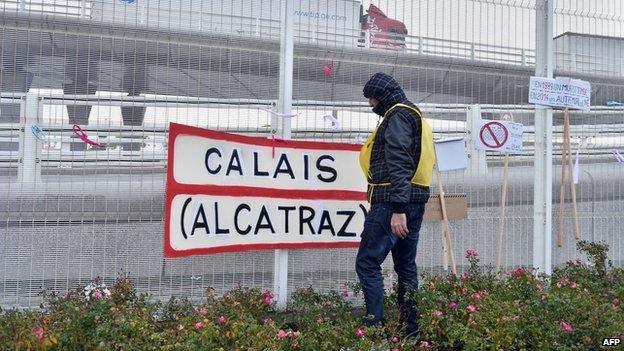I nearly drowned in chocolate
- Published
From a ramshackle camp in the woods outside Calais, a Syrian refugee made his 18th attempt to stow away in a lorry bound for the UK. Here he tells how he ended up in a tank of melted chocolate - an experience that almost killed him.
We met the migrant smuggler at the petrol garage at 2am. The lorries going to the UK were always parked there, near the train station. We usually tried to sneak on board at night, when the drivers were asleep and there weren't so many police around.
There were 25 of us in all, so he split us into groups. Each group was going to sneak on to a different lorry.
The smuggler chose seven of the tallest people. Five of us were Syrian, and there were two Egyptian guys as well. At 25, I was the youngest. The others were all in their mid-30s.
We knew that our lorry was going to the UK because the smuggler had seen a card that gets posted on the lorries when they come into the waiting area. He's a Kurdish guy from Iraq and has been doing this for years. I left Syria with nothing, so I'd been working for him in Calais almost two months to pay my way. He said that these lorries, the ones that carry liquids, go straight on to the train without getting X-rayed.
The driver was still asleep in the cab, so we had to climb up on to the tank quietly. The hatch on top was locked, but the smuggler cut the wires.
We had no idea what was in there, but as soon as he opened it the smell hit us. It was chocolate. We were going to sneak into the UK in a heated tank of liquid chocolate.
It was a freezing night outside, and when we first climbed down into the warm chocolate it was a really good feeling. After about 15 minutes, though, the heat started to get uncomfortable.
I'm about 185cm tall (6ft 1in) but I couldn't touch the bottom of the tank. We were all holding on to the rim of the hatch with one hand and resting the other on the next man's shoulder. If anyone had lost their grip and gone under, we'd never have been able to get to him out.
And so we clung on like that in a circle, submerged in chocolate right up to our necks. The smuggler closed the hatch, leaving a little gap so we could breathe.
The heat was terrible. We had to keep moving our legs to keep from getting totally trapped in the chocolate.
But we stuck it out, hoping the truck would move. It was only a 20-or-30-minute drive to the train, and once we'd passed the checks we'd be able to get out.
But the truck didn't move. We stayed in there for more than two hours. There was nothing to say. We just cursed Bashar al-Assad for putting us in this situation.
In the end, the others started to say that it was too hot, that we had to get out. I wanted to stay. If any one of us left, there'd be chocolate all down the side of the truck and we'd all get caught.
One or two of the guys - big men, older than me - started to cry. In the end we all agreed to leave.
The chocolate was so sticky it took six or seven of us to help each man climb out. The first guy pushed open the hatch and pulled himself up while the rest of us shoved from below.
The last guy struggled most because there was no one to push him up. We were all pulling, but he was getting sucked back down by the chocolate. He had to kick his shoes off to get out. They got left behind.
It was a long walk back to our tent in the woods, and we were covered in chocolate from head to toe - our hands, our hair, our eyes - it was everywhere. It was good chocolate, though. We were still licking at it on the way home. You could see our footprints stretching out on the road behind us.
The narrator of this story eventually got into the UK on a trailer loaded with new lorry cabs. He tried the doors on all these cabs until he found one that was open and hid inside. He has been granted asylum and is now working in an Arabic restaurant in Sheffield.
He told his story to Daniel Silas Adamson and Mamdouh Akbiek of the BBC World Service. Animation by Philippe Cooke. Explore more stories from Syrian refugees.



Thousands of people are living in makeshift camps in Calais hoping that one day they will make it to the UK. Many once had good jobs - but fleeing from war and persecution most now have no money, and little dignity, in a town that is fed up with them.

Subscribe to the BBC News Magazine's email newsletter to get articles sent to your inbox.